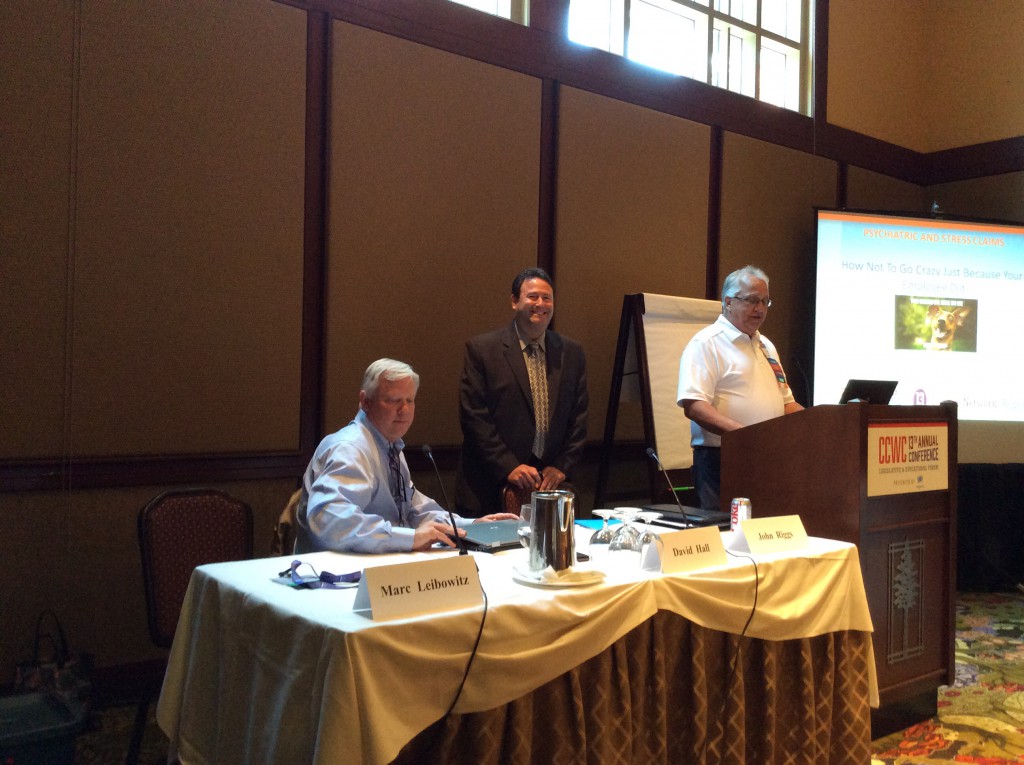Defending Psych/Stress Claims
At the 2015 California Coalition on Workers’ Compensation Annual Conference, Dr. David Hall and Marc Liebowitz from the law firm Laughlin, Falbo, Levy & Moresi presented a session titled, “Psych/Stress Claims – How Not to Go Crazy Just Because Your Employee Did.” This session addressed the interplay between medical and legal issues in California with the defense and timely resolution of psychiatric claims.
Understanding what drives a psych claim:
- Money.
- Time away from work.
- Resonse to physical injury.
- Frustration at work.
- Catalyst for non-industrial issues to be aggrivated or exacerbated.
- Certain personality types lend themselves to someone who will file a psych claim.
What is a psychological injury:
- Emotional conditions or disabilities resulting from real or imagined physical injuries, verbally assaultive or demeaning behavior.
- Organic changes derivative from injury or illness.
Why are psych claims difficult:
- Usually there is no objective physical external signs of injury.
- Stigma / discomfort / proof – employees don’t want to talk about them, we don’t want to ask about them, and others are skeptical that they exist.
- Difficult to value in that they are very subjective.
The workers’ compensation rules do give us some guidance in how to defend these claims:
- The employment must be the “predominant cause” of the employee’s claim.
- The claim must not arise from a “good faith personnel issue”.
- Psychiatric injuries can arise from a specific, traumatic, event-triggering PTSD.
- Psychiatric injury can be compensable if they have a serious physical disability and they have been employed at least six months.
Geography may impact the type of claim being filed and the type of investigation required:
- Not every claim triggers a psych claim.
- Despite the “check the box” forms, more of these claims are seen in the LA Basin compared to other parts of the state.
- There is an influence from unions with the filing of these claims, but the geography correlation is stronger.
The “right team” must be in place to manage the claim:
- When you receive the first report, reach out and communicate to the injured worker immediately. Sometimes the issue may be a misunderstanding or they may just want someone to care.
- With trauma cases be proactive not reactive. If this is a situation that would cause you traumatic stress, it is probably causing the injured worker traumatic stress.
- Consider your “confirmation bias” and other biases when collecting statements.
- Document reactions to personnel actions.
- Send sexual and other harassment cases through workers’ comp and you may avoid a civil case.
- In some areas, the psych QMEs are often unknown to the defense attorneys because they do not frequently handle workers’ comp claims.
- Finding treating psych doctors that are willing to accept workers’ comp cases can also be a challenge.
Return to work is the ultimate goal:
- Allow for step-to-step return-to-work process. For someone who has been away from work for a long time, returning to work, itself, can be traumatic.
- “Plan” with the employee what to say to coworkers.
- Don’t have HR return-to-work meeting the first day back.
- For trauma/death cases, consider a change of work site.
- If you make promises, keep them.


